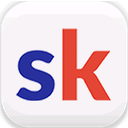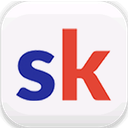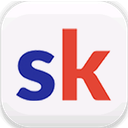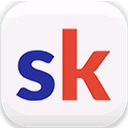Skool vs Thinkific (2026 Comparison)

Skool offers a seamless experience for managing online communities with intuitive features and strong user engagement tools. It's perfect for those focused on community building.
- Intuitive community management features.
- Strong user engagement tools.
- Responsive customer support.
- Limited course creation tools.
- Basic marketing features.
Free plan?
YesStarting price
$99 per month
Thinkific empowers creators with comprehensive course creation tools and robust marketing features. It's ideal for educators and entrepreneurs looking to grow their online education business.
- Comprehensive course creation tools.
- Robust marketing features.
- Extensive customization options.
- Community features less comprehensive.
- Higher learning curve for beginners.
Free plan?
YesStarting price
$36 per monthWhat is Skool?
Skool is an innovative platform designed to create engaging online communities and courses. It helps users by providing a seamless experience for managing and interacting with their audience. With Skool, you can easily organize content, facilitate discussions, and track progress, making it an ideal choice for educators and community leaders. Its intuitive interface and robust features ensure that you can focus on delivering value to your members without getting bogged down by technical complexities.
What is Thinkific?
Thinkific is a comprehensive online course platform that empowers creators to build, market, and sell their courses with ease. It offers a user-friendly interface and a suite of tools to help you design engaging learning experiences. Whether you're an educator, entrepreneur, or business, Thinkific provides the flexibility to customize your courses, manage students, and track performance. Its robust marketing features and integrations make it a powerful choice for those looking to grow their online education business.
Pros and Cons of Skool vs Thinkific

Pros & Cons of Skool
- Skool offers intuitive community management features that make it easy to engage and manage your audience. Its user-friendly interface allows for seamless interaction, making it a great choice for community-focused users.
- With Skool, you have access to strong user engagement tools that foster interaction and community building. These features are designed to keep your audience engaged and active, enhancing the overall experience.
- Skool provides responsive customer support, ensuring that any issues or questions are addressed promptly. This level of support is crucial for maintaining a smooth and efficient user experience.
- While Skool offers essential course creation tools, they are limited compared to other platforms. This might be a drawback for users looking to create highly detailed and interactive courses.
- Skool's marketing features are basic, which might be limiting for those looking to scale their marketing efforts. Users seeking advanced marketing tools may find this aspect lacking.

Pros & Cons of Thinkific
- Thinkific excels in course creation with its comprehensive tools and customization options. It allows you to design engaging and interactive courses, making it ideal for educators and entrepreneurs.
- Thinkific offers robust marketing features that help you promote and sell your courses effectively. From email marketing to affiliate programs, it covers all bases for a successful marketing strategy.
- With Thinkific, you have extensive customization options to tailor your courses and site to match your brand. This level of control over design and functionality is impressive and beneficial for branding.
- Thinkific's community features are less comprehensive compared to other platforms. Users focused on building a thriving community might find this aspect lacking in depth and engagement tools.
- Thinkific has a higher learning curve for beginners, which might be challenging for those new to online course platforms. However, with time and practice, users can fully leverage its potential.
Skool vs Thinkific: At A Glance
Value to Price
Value to Price is a critical dimension that evaluates how well a tool's features and benefits align with its cost. Skool offers a competitive pricing structure, making it a great choice for those seeking a balance between cost and functionality. Thinkific, on the other hand, provides a slightly higher value with its extensive features and customization options, making it ideal for users who need more advanced capabilities.
Ease of Use
Ease of Use measures how intuitive and user-friendly a platform is. Skool's interface is straightforward, allowing users to quickly navigate and manage their communities. Thinkific excels in this area with its drag-and-drop course builder and comprehensive tutorials, making it perfect for beginners and those who prefer a guided approach.
Functionality
Functionality assesses the range and depth of features a tool offers. Skool provides essential tools for community management and course creation, while Thinkific goes a step further with advanced marketing and analytics features. If you require a platform with robust functionality, Thinkific is the better choice.
Scalability
Scalability refers to a platform's ability to grow with your needs. Skool is well-suited for small to medium-sized communities, offering a solid foundation for growth. Thinkific, however, is designed to support larger-scale operations, making it the preferred option for businesses planning significant expansion.
Integrations
Integrations are crucial for connecting your platform with other tools and services. Skool offers a decent range of integrations, but Thinkific stands out with its extensive list of compatible apps and services. For users who rely heavily on third-party tools, Thinkific is the superior choice.
Customer Support
Customer Support evaluates the quality and availability of assistance provided by the platform. Both Skool and Thinkific offer responsive support, but Thinkific's comprehensive help center and community forums give it an edge. If you value extensive support resources, Thinkific is the better option.
Security
Security is a vital dimension that ensures the protection of user data and platform integrity. Skool and Thinkific both prioritize security, implementing robust measures to safeguard information. However, Thinkific's additional security certifications make it a more reliable choice for users with stringent security requirements.
Overall Rating
Overall Rating is a summary of a tool's performance across all dimensions. Skool offers a well-rounded experience with its user-friendly interface and essential features. Thinkific, with its advanced capabilities and extensive support, provides a slightly higher overall value, making it the preferred choice for those seeking a comprehensive solution.
Skool vs Thinkific: A Detailed Breakdown of Key Features
Community Management
When it comes to community management, Skool shines with its intuitive interface and robust features that make it easy to engage and manage your audience. I found it particularly useful for organizing discussions and tracking member progress. Thinkific, while offering community features, focuses more on course creation, which might not be as comprehensive for community-centric needs. If your primary goal is to build and manage a thriving community, Skool is the better choice.
Course Creation
Course creation is where Thinkific truly excels. Its drag-and-drop builder and extensive customization options make it a breeze to create engaging courses. I appreciated the flexibility it offered in designing course content. Skool, while competent, doesn't provide the same level of depth in course creation tools. If you're looking to create detailed and interactive courses, Thinkific is the platform to go with.
Marketing Tools
Thinkific offers a robust set of marketing tools that help you promote and sell your courses effectively. From email marketing to affiliate programs, it covers all bases. Skool, on the other hand, provides basic marketing features, which might be limiting for those looking to scale their marketing efforts. If marketing is a key focus for you, Thinkific's comprehensive tools make it the superior choice.
Analytics
Analytics are crucial for understanding your audience and improving your offerings. Thinkific provides detailed analytics that give you insights into student performance and engagement. Skool offers analytics as well, but they are not as in-depth as Thinkific's. If data-driven decision-making is important to you, Thinkific's analytics capabilities are more suited to your needs.
Customization
Customization is a strong suit for Thinkific, allowing you to tailor your courses and site to match your brand. I found the level of control over design and functionality impressive. Skool offers customization options too, but they are more limited in scope. If you need extensive customization to reflect your brand identity, Thinkific is the better option.
User Engagement
User engagement is vital for retaining members and students. Skool excels in this area with features designed to foster interaction and community building. Thinkific also offers engagement tools, but they are more focused on course interaction. If your goal is to create an engaging community experience, Skool's features are more aligned with your needs.
Pricing Comparison of Skool and Thinkific
To assist you in making an informed choice, we’ve outlined the pricing plans and essential features of Skool and Thinkific. This comparison will highlight the best option for creating your online community or course.

Skool Pricing Plans
- Unlimited courses to create and manage as per your needs.
- Unlimited members can join and participate in your courses.
- Lowest transaction fee of 2.9% compared to competitors.
- 14-day free trial available with the option to cancel anytime.

Thinkific Pricing Plans
- Includes 1 course and 1 community with 2 spaces per community.
- Offers 1 digital download and 1 coaching & webinar session.
- Allows unlimited students with email (30 days) and chatbot support.
- Provides 100% ownership of content and drag and drop course builder.
- Unlimited courses and 1 community with 5 spaces per community.
- 5 digital downloads and 5 coaching & webinar sessions.
- Custom domain, coupons & discounts, and affiliate selling.
- Email and live chat support with branded mobile as an add-on.
- Unlimited digital downloads and coaching & webinars.
- Assignments, bundles and add-on packages, memberships & payment plans.
- Live lessons and advanced course-building options.
- Advanced website code editing and branded mobile as an add-on.
- 3 communities with 20 spaces per community and 2 administrators.
- Phone and priority email support with branded mobile as an add-on.
- Remove Thinkific branding and access Thinkific Analytics.
- Bulk student emailer, bulk enrollments, and API access.
- Unlimited products and administrators with single sign-on (SSO).
- Advanced analytics and dedicated customer success team.
- 1:1 onboarding and launch support with CRM integration.
- Multiple separate Thinkific sites and SCORM compliance.
Our Rating Methodology
We thoroughly evaluate each online course platform, focusing on key aspects like functionality, scalability, and user engagement. By analyzing user feedback and conducting in-depth testing, we ensure our recommendations align with your needs. Each factor is weighted to provide a reliable final rating, helping you make informed decisions.
Skool or Thinkific: Which One Matches Your Business Needs?
Choose Skool If You Need ...
- Intuitive community management
If you are a community-focused user looking for intuitive management features, Skool is the ideal choice. Its user-friendly interface and robust engagement tools make it perfect for building and managing thriving communities.
- Strong user engagement
If you prioritize user engagement and interaction, Skool's features are designed to foster a vibrant community experience. Its tools are tailored to keep your audience engaged and active, enhancing the overall experience.
Choose Thinkific If You Need ...
- Comprehensive course creation
If you need comprehensive course creation tools, Thinkific is the platform to choose. Its drag-and-drop builder and extensive customization options make it easy to design engaging and interactive courses.
- Robust marketing features
If you focus on marketing and selling your courses, Thinkific's robust marketing features are unmatched. From email marketing to affiliate programs, it covers all bases for a successful marketing strategy.
Frequently Asked Questions
 Which platform is better for community management?
Which platform is better for community management?
 Which platform offers more comprehensive course creation tools?
Which platform offers more comprehensive course creation tools?
 Which platform has better marketing features?
Which platform has better marketing features?
 Which platform is more user-friendly for beginners?
Which platform is more user-friendly for beginners?
 Which platform offers better customer support?
Which platform offers better customer support?
 Which platform is more secure?
Which platform is more secure?

Martin Lunendonk
Martin Lunendonk is a senior tech writer specializing in website builders, web hosting, and ecommerce platforms. With a background in finance, accounting, and philosophy, he has founded multiple tech startups and worked in medium to large tech companies and investment banking, bringing deep expertise and reliable insights to his software reviews.



